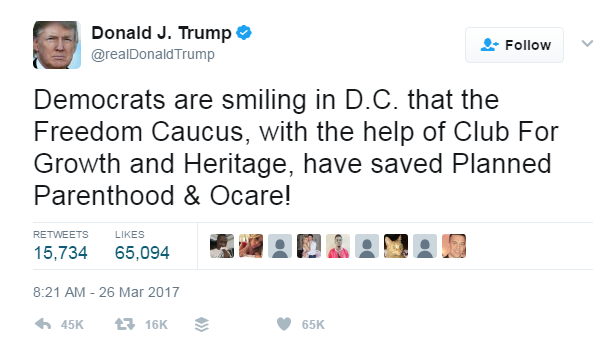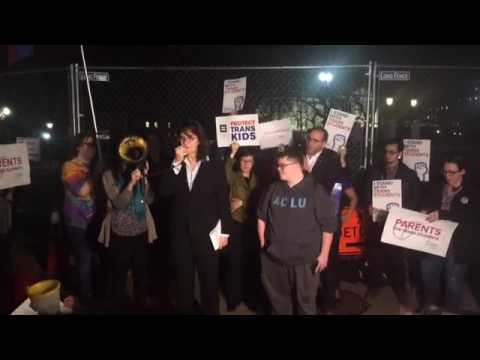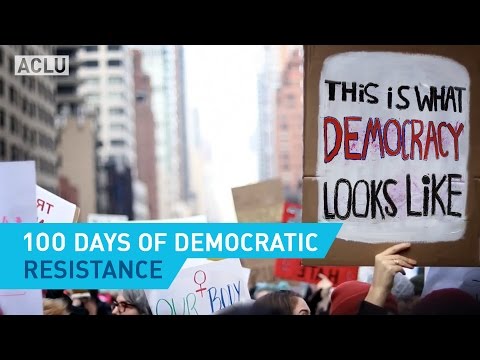
100 Days of Resistance
Despite himself, Donald Trump has accomplished something beautiful — he’s awakened American democracy and reminded us that it’s “We the People” who truly govern.
Introduction
It only took a day for the people to speak.
On the morning after Donald Trump’s inauguration, more than 500,000 people crowded into the nation’s capital for the Women’s March on Washington. The “counter-inauguration,” co-sponsored by the ACLU and many other groups, was likely the single largest protest in American history as sister marches sprung up in cities across America. All told, an estimated 3 to 5 million people took to the streets in defense of our most fundamental values and in opposition to the newly inaugurated president, who threatened so many of them.
The Women’s March, however, was just the beginning. As Trump’s 100th day in office approaches, the mobilization of people in defense of liberty and equality has been broad and deep. It’s also intersectional, establishing relationships across class, gender, racial, and even political and party lines, as some conservatives break ranks out of concern about Trump.
The Resistance, in other words, is everywhere.
Day-By-Day Digest Of President Trump’s 100 Days of Failure
It was at our airports nationwide as Trump rolled out his Muslim ban. It was in town halls across the country as people held Republican members of Congress to account for their promises to repeal Obamacare. It was in front of the White House when Trump revoked an Obama-era guidance that protected transgender students’ right to use the bathroom that corresponds to their authentic selves. And it was in congressional confirmation hearings, most notably Jeff Sessions’, as activists let committee members know that many of Trump’s cabinet picks had terrible records on civil rights and civil liberties.
Civil society’s response to the Trump administration combined with the administration’s own record of legislative, legal, and political failure has clearly affected the White House. Trump came into office with historically low approval ratings, and they basically haven’t budged since. In fact, a recent Pew Research Center report found that going as far back as Ronald Reagan, Donald Trump has the highest disapproval rating of any president during his first 100 days — by far.
The man sitting in the Oval Office now understands intimately that there is a large revolt against his dangerous and often unconstitutional policies in the streets, in the courts, and in legislatures across this great country of ours. Over Donald Trump’s first 100 days, the fight to defend core civil liberties and civil rights has occurred in three primary areas: immigration, healthcare, and transgender rights. As in all struggles, there have been successes and failures, advances and setbacks, but one thing is clear: The Resistance isn’t going anywhere if President Trump continues to violate the Constitution and attack vulnerable communities.
Let Them In!
At 4:42 p.m. on Friday, January 27, President Trump signed Executive Order 13769 and threw the international travel system into disarray. The order blocked citizens from seven Muslim-majority countries from entering the United States for at least three months, suspended the entry of all refugees for at least four months, and barred Syrian refugees indefinitely. No one was sure exactly what that would mean for people in transit when the order was signed.
But at 8:51 p.m., Omar Jadwat, the head of the ACLU’s Immigrants’ Rights Project, got a message: “We have a client being held,” wrote Becca Heller, the director of the International Refugee Assistance Project. An Iraqi refugee entering the country with his family had been detained at New York’s John F. Kennedy International Airport.
The Iraqi refugee, Hameed Darweesh, had worked for 10 years as an interpreter, electrical engineer, and contractor for the U.S. government. He “spent years keeping U.S. soldiers alive in combat in Iraq,” tweeted Brandon Friedman, a former platoon commander who had relied on him during the U.S. invasion. Darweesh’s life was threatened for it, and he got permission to come to the United States because of that. Now he was being detained and denied entry to the United States.
Text messages, conference calls, and emails rallied more than 50 attorneys and law students from the ACLU, International Refugee Assistance Project, a Yale Law School clinic, and the National Immigration Law Center. They began to draft a complaint and request for an emergency stop to deportations under the executive order on behalf of Darweesh and others. At 5:32 a.m., they filed the complaint in Brooklyn federal court.
Saturday morning, the rest of the United States awoke to reports of the chaos the executive order caused: In U.S. airports, family members were worriedly waiting for relatives being detained and threatened with deportation, and around the world, many travelers were not being allowed to board U.S.-bound flights.
By afternoon in JFK’s Terminal 4, more than 50 volunteer attorneys were staffing a makeshift legal clinic at the tables of the Central Diner, coordinated by the IRAP-ACLU legal team. They hunched over their laptops preparing habeas petitions, which said the detained travelers were being held unlawfully. They shared information with members of Congress, who had shown up at the airport to advocate.
And then all of a sudden, the government released Darweesh and dropped its threats to deport him. “I am very thankful,” he told supporters outside the terminal.
But more travelers continued to land and were quickly detained for deportation, but outside something incredible was happening. Each time the AirTrain from the city opened its sliding doors, more protesters appeared. By nightfall, a few dozen protesters outside Terminal 4 had grown to a crowd of thousands. The protesters could not see the travelers in detention inside, but they knew they were just out of reach. In the darkness, the crowd roared: “Let them in! Let them in!”
Meanwhile, across the country, ACLU affiliates had mobilized. They helped organize attorneys to show up at airports and advocate. They filed lawsuits.
In New York, the duty judge for the Brooklyn federal court called for a Saturday night hearing on the emergency stay. When ACLU attorney Lee Gelernt arrived at the courthouse, demonstrators were already gathering, chanting, “Let them stay! Let them stay!” By the time he emerged to tell the crowd the judge had granted the stay, about a thousand people cheered.


By the end of the week, judges in Massachusetts, Virginia, and Washington state had also blocked parts of Trump's order.
And so two things were born together: an executive order based on hatred of Muslims, and a movement to stop it. A new dynamic was emerging to head off the president’s unconstitutional and un-American policies: crowds and courts. It was already becoming clear that lawyers and protesters — rising through separate efforts but with a common goal—could together be a bulwark against the tide of hate pushed out as policy by President Trump.
In following days and weeks, the ACLU and other lawyers continued to chip away at the apparatus supporting the ban. The ACLU filed about a dozen suits challenging aspects of the ban in different courts around the country, including one in Maryland on behalf of a Jewish refugee resettlement agency, HIAS, as well as IRAP and several individuals. Some 50 ACLU affiliates filed 18 coordinated Freedom of Information Act requests with local Customs and Border Protection offices to learn how the ban was implemented at more than 55 airports. The ACLU and other groups asked for an emergency hearing on the Muslim ban from the Inter-American Commission on Human Rights, which monitors human rights throughout the Americas. Borrowing “from the playbook of despots,” as the New York Times noted, the Trump administration boycotted the hearing.
The Trump administration, for its part, gave up on defending the original order but doubled down on the ban. On March 6, the president signed a replacement executive order that kept the same basic policy but was supposed to be easier to defend in court. The ACLU went after that new order in its Maryland case. The federal court there and another in Hawaii quickly blocked the new ban, too. The main parts of the second order have never been enforced due to these court orders, which the government is now fighting on appeal.
Right after he took office, Trump had also signed another pair of executive orders threatening immigrants’ rights. The January 25th orders called for the immediate construction of a border wall with Mexico and aggressive efforts to expand the number of immigration agents and vastly increase the power of federal and local officers to arrest, detain, and deport. These orders also signaled that the federal government would encourage, and even force, state and local police agencies to participate in immigration enforcement — which has proven time and again in the past to lead to race discrimination and illegal stops and detentions of people of color.
In February, the Department of Homeland Security released two memos implementing Trump’s January 25th orders and setting out a grim blueprint for mass deportation. The directives threatened to shred due process and bypass immigration hearings. They elaborated on how local police and municipal officials would become immigration agents and suggested that those who do not would face financial consequences. They proposed expanding an already bloated federal deportation force by 15,000 new agents. They made clear that under Trump, any person without documents could be deported — without regard to their U.S. citizen children, U.S. military service, length of residence in the United States, or their contributions to U.S. society.
Trump had previously said he was sympathetic toward young people whose parents had brought them without authorization to the United States as children. In a December conversation with TIME, he had promised to help people with Deferred Action for Childhood Arrivals, the program that grants them temporary work permits. “We’re going to work something out that’s going to make people happy and proud,” he said.
But Immigration and Customs Enforcement agents started detaining people with DACA too. Agents picked up 22-year-old Daniela Vargas in Jackson, Mississippi, hours after she spoke out publicly about her deportation fears and against the federal government’s new policies. Her DACA status had lapsed while she saved up money to renew it. People protested, her lawyers filed documents, and Vargas was released.
In Portland, ICE agents banged on the door of 25-year-old Francisco Rodriguez, waking him up on a Sunday morning to tell him he would be deported. He was an elementary school teaching assistant, food pantry manager, and church volunteer, who had one conviction for driving under the influence — and was serving in a diversion program to clean his record. The ACLU of Oregon helped organize neighbors to flood the phone lines of the ICE facility where he was being held, share his story on social media, and rally on his behalf — and ICE released him too.
In mid-February, over the course of a few days, ICE conducted raids in 12 states, sparking anguished protests as longtime U.S. residents without criminal records were torn away from their children, their jobs, their lives, and deported.
Immigration agents began to stake out and arrest people at courthouses when they appeared for scheduled hearings: a Texas domestic violence survivor seeking a restraining order, a Michigan father trying to get custody of his children.
Immigration agents even detained passengers disembarking from a domestic flight and demanded that everyone show documents. People tagged the ACLU in photos on Twitter, and our attorneys are investigating the incident.
The ACLU is also setting up a national network of more than 50 law firms to investigate and respond to raids. We are identifying community organizations across the country that can provide support and mapping every facility that could be used to detain immigrants.
And ACLU affiliates are developing their own projects tailored to their local needs: The ACLU of Texas has established a raid hotline. The ACLU of Vermont is investigating whether immigration agents are targeting individuals for deportation in retaliation for their protests against ICE.
During the February raids, ICE agents in Los Angeles stood outside the house of a man they wanted to deport.
“Good morning. Police,” an agent announced, in a video later released by ICE.
The ACLU of Southern California quickly campaigned against ICE agents misrepresenting themselves as police. Soon Los Angeles Mayor Eric Garcetti wrote to ICE “to urge in the strongest possible terms that ICE immediately cease this practice in our city.”
In March, the ACLU launched People Power, a grassroots mobilization program, with the Freedom Cities campaign to create enclaves of resistance to Trump’s anti-immigrant and anti-Muslim policies. The campaign encourages volunteers to meet with their local police precinct to discuss policies that make the entire community safer by refusing to turn police into immigration agents. More than 250,000 people have signed up for People Power, and the Freedom Cities resistance training video has been viewed more than a million times.
And just four days before his 100th day, the courts intervened again to stop Donald Trump’s illegal anti-immigrant agenda. On April 25, a federal court in California blocked part of Trump’s executive order defunding so-called “sanctuary cities,” which prohibit their local law enforcement from cooperating with federal immigration enforcement. When issuing the nationwide injunction, the judge called Trump’s order “unconstitutional on its face.”
These first 100 days have been marked by amazing popular protests and significant legal victories. They show that together, citizens and lawyers can defeat hateful, unconstitutional, and un-American immigration policy.
Remember, Every Member of Congress Wakes Up Thinking About Re-Election
Andraéa LaVant is one of the millions of Americans living with a disability who has worked hard to live independently and hold a fulfilling job. Andraéa’s independence, and all she had worked so hard for, was threatened when Congress tried to repeal the Affordable Care Act and radically alter the Medicaid program that provides her with the critical services she needs to live a full and free life.
Andraéa’s is just one story that demonstrates the devastating impact of repealing the Affordable Care Act and gutting Medicaid. When House Republicans introduced their ACA repeal bill in March, they could not hide the danger it represented. According to the nonpartisan Congressional Budget Office, the House Republicans' American Health Care Act (AHCA) would have resulted in 24 million people losing insurance coverage by 2026. It would have also forced $880 billion in Medicaid cuts over the next 10 years to help pay for tax cuts for the rich.
The results would have been devastating.
People with disabilities, including children, would have lost services and support they need. Millions of women would have lost coverage entirely and, with it, access to birth control and other preventive care that the ACA guarantees. Many of those who retained insurance would have been left without coverage for maternity care and would have faced new restrictions on abortion coverage. Medicaid patients already struggling to get by would be blocked from accessing care at Planned Parenthood, forcing its health centers to close and leaving many of its 2.5 million patients without life-saving care.
But then something extraordinary happened. People all across the country — in red and blue states and in cities and towns — organized to stop Trump and save health care.
Outraged citizens defeated this ill-advised effort by calling or emailing their members of Congress and by showing up to their town halls in protest. “We the people” convinced enough members of Congress that repealing the ACA and gutting Medicaid was the wrong way to go. Over 65,000 ACLU activists sent direct messages and made phone calls to their representatives in Congress. In total, ACLU activists sent almost 215,000 messages and made 3,000 calls. One Republican congressman, Rep. Dan Donovan from New York, estimated that calls were running 1,000 to 1 against the ACA repeal. The lesson couldn’t be clearer: If the people make their voices heard loud and clear, politicians will listen.
The ACLU was just one of the many organizations working to empower people to contact their representatives in Congress and condemn the efforts to repeal the ACA. The Protect Our Care coalition, Planned Parenthood, MoveOn, Indivisible, the Consortium for Citizens with Disabilities, and thousands of others worked tirelessly day and night to protect the health of millions of Americans by persuading people to contact their members of Congress.
“[P]erhaps the only great thing about Congress is that members are responsive to their constituents,” Ezra Levin, a former congressional staffer and co-founder of Indivisible, told The Nation. “Every member of Congress wakes up thinking about re-election.”
In response to the groundswell of support for Obamacare, President Trump did what he always does when he doesn’t like something — deny it’s real. Trump tweeted:
Why is the ACA so important, particularly from a civil rights perspective? Why did so many people take the time to cram into town halls and call and email their members of Congress to demonstrate their support for the law?
Because, for all its imperfections, Obamacare has improved and saved people’s lives, prohibited discrimination, and made it possible for people to be engaged citizens. Since its passage in 2010, the law has played a crucial role in ending policies and practices that discriminated against women, people with disabilities, LGBT people, and minorities. It improved and expanded Medicaid services that have helped end some of the segregation and institutionalization of people with disabilities. Without these services, the right to liberty and autonomy of people with disabilities would be severely undermined.
It also prohibited insurers from charging women more than men for coverage and ensured coverage for birth control and maternity and newborn care. It included the first ever federal civil rights provision prohibiting discrimination in health care on the basis of sex, in addition to race, color, national origin, age, or disability in certain health programs and activities. In short, the ACA made health care coverage and access fairer and more equitable. As a result, Obamacare has helped preserve the life and liberty of millions of people.
The defeat of the ACA repeal was a triumph of our democracy. Millions of Americans have embraced progress and do not want to go back. And President Trump didn’t care for it one bit. He tweeted:

But the fight for health care access is far from over. President Trump and leaders in the House of Representatives are in talks to try to repeal the ACA once again. We the people have to remain vigilant and continue to stand up for basic rights. We won this round because of the power of the people.
A Boy Becomes the Face of a Movement
On the evening of February 22, 2017, the Trump administration tried to stop the momentum in the urgent fight for trans equality.
In two separate releases, the Departments of Education and Justice announced that they were revoking Obama-era federal guidance that clarified that Title IX — a federal law prohibiting sex discrimination in school programs receiving federal funding — protected the rights of transgender students to use the bathroom consistent with their gender identity. When the news of the administration’s decision broke, the face of the opposition to the Trump administration’s cruel maneuver was not a seasoned politician or professional advocate. It was a high school senior from Gloucester County, Virginia.
At a rally organized by the National Center for Transgender Equality in front of the White House, Gavin Grimm stood before a group of protestors and delivered a message of love, inclusion, and defiance through a megaphone. In some ways the moment was somber — in the crowd were frightened transgender students and their parents. But that night outside of President Trump’s front door, Gavin knew that the crowd before him represented a far more powerful body than even our highest ranks of political office.


Note: Gavin's speech begins around the 8:50 mark. Video courtesy of National Center for Transgender Equality, photo by Geoff Livingston.
“I saw people who had a common goal in mind: to create a world in which every person is treated with the same dignity and respect, a world in which institutions do not use their power to attack the vulnerable minorities of our nation,” Gavin recounted in an op-ed for Vice. “A world where it isn't so scary to be trans or to love someone who is.”
Gavin Grimm did not ask to be a public face in a civil rights battle. All he asked for was the right to be treated like everyone else. And so when his school board barred him from the same restrooms that every other boy at school uses, he took action. At the time, he was just 15-years-old.
With the help of the ACLU, he sued his school board and won a historic victory in the U.S. Court of Appeals for the Fourth Circuit. But the school board asked the Supreme Court to step in to stop Gavin from exercising his rights, and it did so, staying the lower court’s order. In late October of last year, the Supreme Court announced that it would review his case and decide whether Title IX’s ban on sex discrimination protects transgender students from discrimination.
The federal appeals court that ruled for Gavin did so by deferring to the Title IX guidance from the Obama Departments of Education and Justice. When the Trump administration revoked that guidance, it did so with the clear intention of disrupting Gavin’s case before the Supreme Court.
It worked.
In March, just a few days after the rescission of the Title IX guidance, the Supreme Court announced that it was sending Gavin’s case back down to a lower court to be reheard in light of the Trump administration’s change in position. Gavin’s case will continue in the lower courts, where he may yet win or lose.
Despite claiming support for LGBT rights on the campaign trail, President Trump’s administration is staffed with individuals, including those at very senior levels, who have opposed equality for LGBT people at every turn. The Trump administration’s targeting of vulnerable transgender youth through the revocation of the Title IX guidance and the repeated support for state-level anti-trans laws are just two examples of the many things that have exposed the deep anti-LGBT goals of his administration.
The Trump administration has abdicated its responsibility to protect the rights of the LGBT community, and so groups like the ACLU will pick up the slack.
In North Carolina, the Department of Justice led by Attorney General Jeff Sessions used the sham repeal of HB2 as an excuse to end its lawsuit against the state. However, the new law is a nearly identical set of discriminatory mandates and continues to encourage discrimination against transgender people. Together with Lambda Legal, our own legal challenge to North Carolina’s disastrous anti-LGBT law continues on, now without the support of the federal government.
Mark these words: LGBT rights groups will bring this fight wherever it’s necessary. We will continue our relentless fight for transgender rights, taking legal action wherever we hear that transgender students are being targeted. In Pennsylvania, for instance, the ACLU is helping transgender students stand up against a national anti-LGBT group that is trying to punish a school district for doing the right thing and treating transgender students with the dignity and respect that they deserve and the law requires.
In April, the Fourth Circuit dissolved the injunction that Gavin had won a year earlier, as the Supreme Court’s dismissal order required. He will now graduate high school without getting what he deserved: the right to use the same restroom as every other boy at school and to be treated equally. But even in this setback, the struggle for trans equality has grown stronger.
Senior Judge Andre Davis of the Fourth Circuit wrote an unusual opinion praising Gavin’s courage, likening Gavin to civil rights pioneers Dred Scott, Mildred and Richard Loving, and Edie Windsor. The judge stressed that this case was “about much more than bathrooms.”
“[B]y challenging unjust policies rooted in invidious discrimination,” Davis wrote, “G.G. takes his place among other modern-day human rights leaders who strive to ensure that, one day, equality will prevail, and that the core dignity of every one of our brothers and sisters is respected by lawmakers and others who wield power over their lives.”
Gavin Grimm is a reminder that our liberties depend on the courage of ordinary people, standing up for their rights.
Fight for the Future


We have largely succeeded in obstructing Trump’s anti-civil liberties agenda, but we must be ready to go the distance, as the fight for our liberty and dignity has only begun.
We have little doubt that new fronts in the fight for liberty will emerge as the president’s term grinds on. Much like on the campaign trail, Donald Trump has consistently voiced opinions that should send shivers up civil libertarian spines. He remains hostile to freedom of the press, calling journalists “the enemy of the people” and renewing his calls to change federal libel laws, which don’t exist.
His attorney general, Jeff Sessions, is patently hostile to civil rights. But it’s the president’s “benign neglect” in actual hiring that really shows his true colors when it comes to protecting Americans' individual rights. Of the 66 positions the ACLU identified as central to protect civil rights and liberties, only 12 have been filled so far. And if he fills them with people like Sessions and DeVos, they will do more to undermine than to protect civil rights and civil liberties.
That’s why we and an ever-expanding and multiplying network of organizations are here: to help the American people push back against the darkness spilling out of the White House.
Last summer, the ACLU put out a constitutional analysis of Trump’s policy and campaign statements. We concluded that Donald Trump was a “one-man constitutional crisis” who presented the greatest threat to civil rights and civil liberties in modern American history. Unfortunately, we couldn’t have been more correct.
But our analysis also came with a vow if the unthinkable happened. We pledged to fight every day to protect the Constitution and the individual rights it guarantees from the depredations of the Trump administration. We kept our promise to hold him accountable for the first 100 days, and we will continue to do so for as long as his administration lasts.
Interactive Timeline Of Trump's First 100 Days In Office
The ACLU — today, tomorrow, and for the rest of the Trump presidency — will be vigilant and ready. We will not go quietly into the night. The alarm has been raised, and in solidarity with all those who resist the Trump administration’s attacks on our rights in ways both big and small, we will fight back against the anti-civil-liberties ethos that has taken up residence at 1600 Pennsylvania Avenue.
Ironically the greatest threat to American democracy in recent memory has awoken the democratic and liberty-loving spirit of millions of Americans. And it’s a beautiful thing.
Anthony Romero is the executive director of the American Civil Liberties Union.







